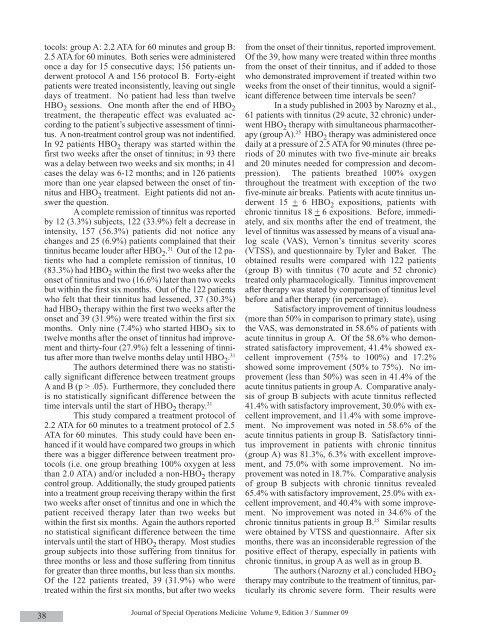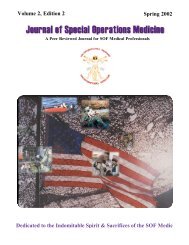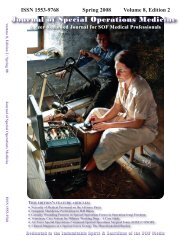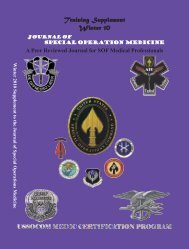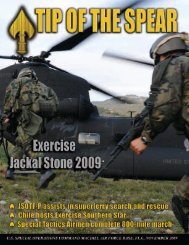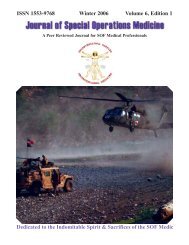tocols: group A: 2.2 ATA for 60 minutes and group B:2.5 ATA for 60 minutes. Both series were administeredonce a day for 15 consecutive days; 156 patients underwentprotocol A and 156 protocol B. Forty-eightpatients were treated inconsistently, leaving out singledays of treatment. No patient had less than twelveHBO 2 sessions. One month after the end of HBO 2treatment, the therapeutic effect was evaluated accordingto the patient’s subjective assessment of tinnitus.A non-treatment control group was not indentified.In 92 patients HBO 2 therapy was started within thefirst two weeks after the onset of tinnitus; in 93 therewas a delay between two weeks and six months; in 41cases the delay was 6-12 months; and in 126 patientsmore than one year elapsed between the onset of tinnitusand HBO 2 treatment. Eight patients did not answerthe question.A complete remission of tinnitus was reportedby 12 (3.3%) subjects, 122 (33.9%) felt a decrease inintensity, 157 (56.3%) patients did not notice anychanges and 25 (6.9%) patients complained that theirtinnitus became louder after HBO 2 . 31 Out of the 12 patientswho had a complete remission of tinnitus, 10(83.3%) had HBO 2 within the first two weeks after theonset of tinnitus and two (16.6%) later than two weeksbut within the first six months. Out of the 122 patientswho felt that their tinnitus had lessened, 37 (30.3%)had HBO 2 therapy within the first two weeks after theonset and 39 (31.9%) were treated within the first sixmonths. Only nine (7.4%) who started HBO 2 six totwelve months after the onset of tinnitus had improvementand thirty-four (27.9%) felt a lessening of tinnitusafter more than twelve months delay until HBO 2 . 31The authors determined there was no statisticallysignificant difference between treatment groupsA and B (p > .05). Furthermore, they concluded thereis no statistically significant difference between thetime intervals until the start of HBO 2 therapy. 31This study compared a treatment protocol of2.2 ATA for 60 minutes to a treatment protocol of 2.5ATA for 60 minutes. This study could have been enhancedif it would have compared two groups in whichthere was a bigger difference between treatment protocols(i.e. one group breathing 100% oxygen at lessthan 2.0 ATA) and/or included a non-HBO 2 therapycontrol group. Additionally, the study grouped patientsinto a treatment group receiving therapy within the firsttwo weeks after onset of tinnitus and one in which thepatient received therapy later than two weeks butwithin the first six months. Again the authors reportedno statistical significant difference between the timeintervals until the start of HBO 2 therapy. Most studiesgroup subjects into those suffering from tinnitus forthree months or less and those suffering from tinnitusfor greater than three months, but less than six months.Of the 122 patients treated, 39 (31.9%) who weretreated within the first six months, but after two weeksfrom the onset of their tinnitus, reported improvement.Of the 39, how many were treated within three monthsfrom the onset of their tinnitus, and if added to thosewho demonstrated improvement if treated within twoweeks from the onset of their tinnitus, would a significantdifference between time intervals be seen?In a study published in 2003 by Narozny et al.,61 patients with tinnitus (29 acute, 32 chronic) underwentHBO 2 therapy with simultaneous pharmacotherapy(group A). 25 HBO 2 therapy was administered oncedaily at a pressure of 2.5 ATA for 90 minutes (three periodsof 20 minutes with two five-minute air breaksand 20 minutes needed for compression and decompression).The patients breathed 100% oxygenthroughout the treatment with exception of the twofive-minute air breaks. Patients with acute tinnitus underwent15 + 6 HBO 2 expositions, patients withchronic tinnitus 18 + 6 expositions. Before, immediately,and six months after the end of treatment, thelevel of tinnitus was assessed by means of a visual analogscale (VAS), Vernon’s tinnitus severity scores(VTSS), and questionnaire by Tyler and Baker. Theobtained results were compared with 122 patients(group B) with tinnitus (70 acute and 52 chronic)treated only pharmacologically. Tinnitus improvementafter therapy was stated by comparison of tinnitus levelbefore and after therapy (in percentage).Satisfactory improvement of tinnitus loudness(more than 50% in comparison to primary state), usingthe VAS, was demonstrated in 58.6% of patients withacute tinnitus in group A. Of the 58.6% who demonstratedsatisfactory improvement, 41.4% showed excellentimprovement (75% to 100%) and 17.2%showed some improvement (50% to 75%). No improvement(less than 50%) was seen in 41.4% of theacute tinnitus patients in group A. Comparative analysisof group B subjects with acute tinnitus reflected41.4% with satisfactory improvement, 30.0% with excellentimprovement, and 11.4% with some improvement.No improvement was noted in 58.6% of theacute tinnitus patients in group B. Satisfactory tinnitusimprovement in patients with chronic tinnitus(group A) was 81.3%, 6.3% with excellent improvement,and 75.0% with some improvement. No improvementwas noted in 18.7%. Comparative analysisof group B subjects with chronic tinnitus revealed65.4% with satisfactory improvement, 25.0% with excellentimprovement, and 40.4% with some improvement.No improvement was noted in 34.6% of thechronic tinnitus patients in group B. 25 Similar resultswere obtained by VTSS and questionnaire. After sixmonths, there was an inconsiderable regression of thepositive effect of therapy, especially in patients withchronic tinnitus, in group A as well as in group B.The authors (Narozny et al.) concluded HBO 2therapy may contribute to the treatment of tinnitus, particularlyits chronic severe form. Their results were38Journal of <strong>Special</strong> <strong>Operations</strong> Medicine Volume 9, Edition 3 / <strong>Summer</strong> 09
similar to those of other authors, indicating that HBO 2therapy can reduce tinnitus even if it has been presentfor a long time. 25-27The authors reported the wrong data for theacute tinnitus group B patients in their results sectionand unfortunately based their conclusions using the incorrectdata. Using the correct data (shown in Table 2of there study) HBO 2 therapy is shown to be more beneficialin the acute tinnitus stage (group A compared togroup B) than it is in the chronic stage (group A comparedto group B). While there is a 17.2% difference insatisfactory improvement in acute tinnitus patients comparinggroup A to group B, there is only a 15.9% differencein satisfactory improvement in chronic tinnituspatients comparing group A to group B.In a prospective controlled study conducted byBiesinger et al.(1998), 211 cases of acute tinnitus (tinnitusfor less than three months) were assessed after receivingone of three treatment protocols. 32 Of the 211cases of acute tinnitus, 69 patients were treated withhaemodilution and cortisone alone and had no HBO 2therapy. Of the 142 patients that had HBO 2 therapy, 72of these were after unsuccessful haemodilution.Of the 69 cases in which the patients receivedhaemodilution only, 36.2% healed completely, 38.8%cases did not notice a change, and 25% of the patientsreported a decompensation. Of the 142 cases receivingHBO 2 therapy, 64.1% healed completely, 17.9% experiencedno change, and 18% reported a decompensation.Out of the 72 cases receiving HBO 2 therapy afterfailure of haemodilution, 51.4% healed completely,whereas 37.5% reported improvement, 11.1% experiencedno change in their tinnitus, and 0% of the casesworsened. 7,32 The results demonstrated a better outcomefor patients with acute tinnitus if they received HBO 2therapy, especially the high rate of decompensated tinnitusin patients receiving solely haemodilution.In a study published in 1997 by Delb et al., 33 atotal of 193 patients, having undergone and failed primaryintravenous hemorheologic therapy, were treatedwith HBO 2 therapy. Tinnitus was evaluated before,after ten sessions, and after 15 sessions using a tinnitusquestionnaire. Measurable improvements of the tinnitusoccurred in 22% of the patients, moderate improvementin 17% of cases, excellent improvement in 10.4%of cases and complete resolution in two patients. 33Though clinical significance was not reported, the improvementrate decreased in those cases where the timefrom onset of tinnitus exceeded 40 days. In addition,while the improvement rate slightly increased in patientsreceiving 15 sessions compared to those receiving10 sessions, the clinical significance, once again, wasnot reported. The authors concluded that HBO 2 therapyseems to be a moderately effective additional treatmentin the therapy of tinnitus after primaryhemorheologic therapy, provided the time from onset oftinnitus is less than one month. 33In another study published in 1997 by Kau etal., 26 355 patients with tinnitus, who had not respondedto treatment with medications, were given HBO 2 therapy.Of the 355 patients, 192 suffered from tinnitus forless than three months and 163 suffered from tinnitusfor more than three months. HBO 2 therapy consistedof a pressure increase phase of 20 minutes, at the endof which a diving depth of 2.5 ATA was reached. Thispressure was held for 70 minutes which was then followedby an ascent phase lasting 20 minutes. Pureoxygen was inhaled by mask during the entire treatmentperiod. The number of treatments was not reportedand a non-HBO 2 therapy control group was notidentified. Subjective evaluation of tinnitus was expressedby means of a visual analog scale.For the patients in whom the first episode oftinnitus was within three months before HBO 2 therapy,excellent improvement was seen in 6.7%, noticeableimprovement in 44.3%, unchanged in 44.3%, and atemporary increase in the severity of tinnitus in4.7%. 26,30 Patients who had tinnitus for more than threemonths before HBO 2 therapy showed a less favorableresponse. In none of the patients did the tinnitus fullyresolve. Noticeable improvement was reported by34.4% of the patients, no change in tinnitus was appreciatedby 62% of the patients and an intermittent increasewas reported by 3.6% of the patients. 26,30The authors feel the results justify the positionthat patients, who have been treated unsuccessfully by“conventional” means, may still have a chance of improvementin their symptoms when they can be givenHBO 2 therapy within three months of the onset of theirtinnitus. 26In 1997, an article by Bohmer was publishedreporting on two prospective studies conducted at theInstitute for Hyperbaric Medicine, Orthopaedic UniversityClinic, Frankfurt, Germany. 28 In the first study,47 patients received HBO 2 therapy within three monthsof tinnitus first occurring. In each case they receivedpharmacotherapy often combined with cortisone priorto undergoing HBO 2 therapy. In 64% of the cases animprovement was attained. During the follow-up examinations27% of the patients confirmed a further decreaseof the ringing in their ears during the twomonths following treatment.In the second study, 381 patients underwentHBO 2 therapy for the treatment of their tinnitus. Onaverage 15 single treatments for 90 minutes with apressure of 2.2 to 2.5 ATA were carried out. Daily, atthe same time each day, the patients were asked to subjectivelyannotate their sound volume. Complete resolutionof tinnitus was seen in 3.9% of the patients.Noticeable improvement was seen in 34.1%, slight improvementin 31.8%, no improvement in 28.1%, andworsening of tinnitus in 2.1% of the patients. 28 WithHBO 2 therapy, the improvement of tinnitus sound from“becoming less” to “being completely healed” was ap-Tinnitus, a Military Epidemic:Is Hyperbaric Oxygen Therapy the Answer?39
- Page 1 and 2: Volume 9, Edition 3 / Summer 09 Jou
- Page 3 and 4: An 18D deworms a camel during a “
- Page 5 and 6: Field Evaluation and Management of
- Page 7 and 8: The circumferential anchoring strip
- Page 9 and 10: In doing so, all the skin is closed
- Page 11 and 12: NATO SOF Transformation and theDeve
- Page 13 and 14: current and future operations, thes
- Page 15 and 16: sion of a physician, and limited pr
- Page 17 and 18: REFERENCES1. James L. Jones, “A b
- Page 19 and 20: This article is the first of two me
- Page 21 and 22: Figure 4 : A Special Forces medic c
- Page 23 and 24: exposure. Conversely, the customary
- Page 25 and 26: 7. Ted Westmoreland. (2006). Attrib
- Page 27 and 28: first three days of injury, althoug
- Page 29 and 30: 9. Markgraf CG, Clifton GL, Moody M
- Page 31 and 32: the only sign of OCS may be elevate
- Page 33 and 34: E. The canthotomy allows for additi
- Page 35 and 36: 33. Rosdeutscher, J.D. and Stradelm
- Page 37 and 38: Tinnitus, a Military Epidemic:Is Hy
- Page 39 and 40: The development of chronic NIHL pro
- Page 41: supplied by diffusion. During expos
- Page 45 and 46: promising effect on tinnitus. Howev
- Page 47 and 48: ADDITIONAL REFERENCESHoffmann, G; B
- Page 49 and 50: et al. demonstrated that both right
- Page 51 and 52: TYPICAL CHEST RADIOGRAPH FINDINGS I
- Page 53 and 54: 11. Norsk P, Bonde-Petersen F, Warb
- Page 55 and 56: ABSTRACTS FROM CURRENT LITERATUREMa
- Page 57 and 58: tourniquet times are less than 6 ho
- Page 59 and 60: tal from July 1999 to June 2002. In
- Page 61 and 62: Operation Sadbhavana: Winning Heart
- Page 63 and 64: CENTRAL RETINAL VEIN OCCLUSION IN A
- Page 65 and 66: of the X chromosome. Notable is tha
- Page 67 and 68: AUTHORS*75th Ranger Regiment6420 Da
- Page 69 and 70: Casualties presenting in overt shoc
- Page 71 and 72: PSYCHOLOGICAL RESILIENCE AND POSTDE
- Page 73 and 74: spondents without PTSD (M = 4.6, SD
- Page 75 and 76: patients, whereas the mean score of
- Page 77 and 78: 29. Whealin JM, Ruzek JI, Southwick
- Page 79 and 80: average, time between return from d
- Page 81 and 82: ing functioning in both PTSD (Zatzi
- Page 83 and 84: Editorial Comment on “Psychologic
- Page 85 and 86: Blackburn’s HeadhuntersPhilip Har
- Page 87 and 88: The Battle of Mogadishu:Firsthand A
- Page 89 and 90: Task Force Ranger encountered enemy
- Page 91 and 92: Peter J. Benson, MDCOL, USACommand
- Page 93 and 94:
Numerous military and civilian gove
- Page 95 and 96:
Anthony M. Griffay, MDCAPT, USNComm
- Page 97 and 98:
This is a great read that speaks di
- Page 99 and 100:
and twenty-eight. Rabies immune glo
- Page 101 and 102:
Rhett Wallace MD FAAFPLTC MC SFS DM
- Page 103 and 104:
LTC Craig A. Myatt, Ph.D., HQ USSOC
- Page 105 and 106:
LTC Bill Bosworth, DVM, USSOCOM Vet
- Page 107 and 108:
Europe, Mideast, Africa and SWAU.S.
- Page 109 and 110:
SOF and SOF Medicine Book ListWe ha
- Page 111 and 112:
TITLE AUTHOR ISBNCohesion, the Key
- Page 113 and 114:
TITLE AUTHOR ISBNI Acted from Princ
- Page 115 and 116:
TITLE AUTHOR ISBNRats, Lice, & Hist
- Page 117 and 118:
TITLE AUTHOR ISBNThe Healer’s Roa
- Page 119 and 120:
TITLE AUTHOR ISBNGuerilla warfare N
- Page 121 and 122:
TITLEAUTHORBlack Eagles(Fiction)Bla
- Page 123 and 124:
TITLE(Good section on Merrill’s M
- Page 125 and 126:
GENERAL REFERENCESALERTS & THREATSB
- Page 127 and 128:
Aviation Medicine Resources: http:/
- Page 129 and 130:
LABORATORYClinical Lab Science Reso
- Page 131 and 132:
A 11 year old boy whose tibia conti
- Page 133 and 134:
Meet Your JSOM StaffEXECUTIVE EDITO
- Page 135 and 136:
Special Forces Aidman's PledgeAs a


